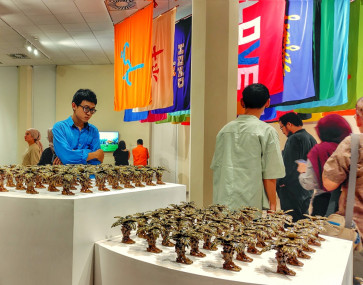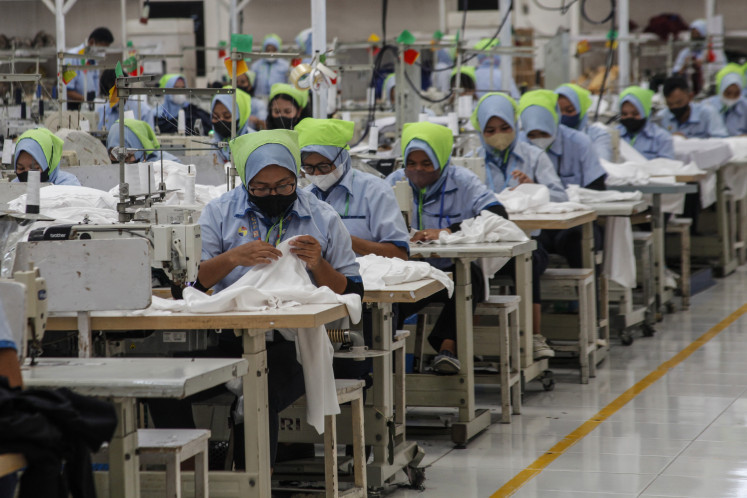Popular Reads
Top Results
Can't find what you're looking for?
View all search resultsPopular Reads
Top Results
Can't find what you're looking for?
View all search resultsPreachers campaign for reproductive health
Shared responsibility: Nutrition officer Sri Sugiyanti (right) gives information on reproductive health to a couple during a premarital counseling session in Juwiring, Klaten regency, Central Java
Change text size
Gift Premium Articles
to Anyone
S
hared responsibility: Nutrition officer Sri Sugiyanti (right) gives information on reproductive health to a couple during a premarital counseling session in Juwiring, Klaten regency, Central Java. (JP/Kusumasari Ayuningtyas)
One Sunday morning, preacher Tri Prasetyaningsih shared a rather depressing story about mothers with the congregation of the Indonesian Christian Church in Klaten, Central Java.
She talked about a new mother who went away from her house. It turned out that the mother suffered from postpartum depression, known as the baby blues.
Tri also spoke about a tragedy that happened to a mother of twins. She fed water excessively to one of the twins until the baby was dead. The mother later revealed that she was depressed that some people, including her husband, had blamed her that the baby was thinner than its twin.
“People tend to think that a mother holds full responsibility for her baby, while the husband feels that his responsibility is only giving financial support. The truth is, raising a child is also the responsibility of the father and the whole family,” Tri told around 30 people in the congregation.
Kuncoro, a 45-year-old congregation member, agrees with Tri.
“I am not married yet, but I have an older sister. We [the whole family] pay attention to her and her children’s condition,” he said.
Preachers in churches, mosques and temples across Klaten regency are encouraged to spread messages on reproductive health and men’s role in keeping mothers and children healthy. The movement is part of the Klaten administration’s strategy to reduce maternal and infant mortality rates.
The regency recorded the deaths of 13 mothers and 96 babies last year.
Klaten’s religious affairs office head, Anief Solikhin, says sermons have been an effective medium to raise men’s awareness on the issue.
“We have not set a target for the frequency [of health-related preaching]. We only encourage khatib (Muslim preachers) and figures of other religions to disseminate the issues according to the situation and condition in their respective places,” Anief said.
He added that his office had also included reproductive health education in its premarital counseling program.
Klaten Regional Hospital Bagas Waras director Limawan Budi Wibowo conveyed his support for the movement.
“Healthcare information has been well-disseminated among women. However, men also need to acquire the same knowledge so they will be able to support the women in their families,” he said.
The movement also won praise from the Women’s Solidarity for Humanity and Human Rights (SPEK-HAM) foundation.
The group’s director Rahayu Purwaningsih said it had been challenging to attract men to attend health discussion forums in community health centers (Puskesmas).
“I believe religious study is the most effective way [to reach men],” she said, adding that the SPEK-HAM foundation planned to take a similar approach in their upcoming program.
The Klaten administration has conducted a number of programs to push down the mortality rate of babies and mothers. Some programs have been initiated by district administrations.
In Juwiring district, for example, local nutrition officer Sri Sugiyanti initiated a health information program called Juwita 1000 Harta in 2013. Under the program, marriage counselors, preachers and community figures share messages on the importance of keeping mothers and babies healthy in their first 1,000 days.
Sri said preachers and community figures had been successful in reaching out to men.
“The program’s main target is indeed the wives, but we expect the husbands or other male members of their respective families to be actively involved as well,” she said.
Central Java Governor Ganjar Pranowo, meanwhile, initiated the 5NG program to monitor the health of expectant mothers.
The province has relatively high maternal and infant mortality rates. There are 19 deaths per 1,000 live births in Central Java. According to data from UNICEF, 1,077 mothers died between 2016 and 2017 because of baby deliveries not assisted by skilled medical practitioners.
“This poses a serious risk to our society. We found that the problem is rooted in communication. People are not aware that expecting mothers may face a multitude of problems, from anemia to malnutrition,” the governor told The Jakarta Post on Nov. 19 in Surakarta, Central Java.
“We need to pay more attention to this situation,” he added.










